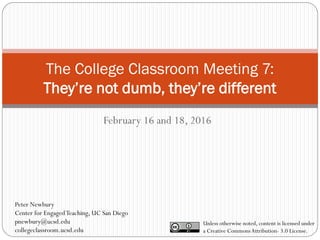
CIRTL Spring 2016 The College Classroom Meeting 7 - They're not dumb, they're different
- 1. CIRTL – The College Classroom Meeting 7: They’re not dumb, they’re different March 10, 2016 Unless otherwise noted, content is licensed under a Creative CommonsAttribution- 3.0 License. Peter Newbury Center for EngagedTeaching, UC San Diego pnewbury@ucsd.edu Tom Holme Department of Chemistry, Iowa State University taholme@iastate.edu collegeclassroom.ucsd.edu
- 2. Eric: collegeclassroom.ucsd.edu2 The lack of community, together with the lack of interchange between the professor and the students combines to produce a totally passive classroom experience. (p. 25)
- 3. Eric: collegeclassroom.ucsd.edu3 To prevent this from happening,what would you consider first? A) how people learn B) learning outcomes C) assessment D) choice of instructional strategies E) fixed/growth mindset The lack of community, together with the lack of interchange between the professor and the students combines to produce a totally passive classroom experience. (p. 25)
- 4. collegeclassroom.ucsd.edu4 build on students’ diversity to enhance learning do something about negative impacts when they occur recognize the impact of student diversity on students’ learning experiences and success design and deliver the course to minimize negative impacts of diversity Note: This is the slide I used in our meeting. I am very grateful to Derria B. who pointed out my poor choice of the phrase “negative impacts”. It’s not diversity that’s negative – it’s our responses to diversity that can be negative.With Derria’s help, I revised this pyramid.
- 5. collegeclassroom.ucsd.edu5 recognize the impact of student diversity on students’ learning experiences and success
- 6. collegeclassroom.ucsd.edu6 do something about negative responses to diversity when they occur recognize the impact of student diversity on students’ learning experiences and success
- 7. collegeclassroom.ucsd.edu7 do something about negative responses to diversity when they occur recognize the impact of student diversity on students’ learning experiences and success design and deliver the course to minimize negative responses to diversity
- 8. collegeclassroom.ucsd.edu8 take advantage of students’ diversity to enhance learning do something about negative responses to diversity when they occur recognize the impact of student diversity on students’ learning experiences and success design and deliver the course to minimize negative responses to diversity
- 9. collegeclassroom.ucsd.edu9 teaching assistant who, while well-meaning, has problems communicating in English, only around certain days of the week physics professor extremely muscular “frat boy type” who always mutters the right answer several seconds before anyone else Hispanic woman who needs to get an “A” to receive an ROTC scholarship for next year student impatient with Eric’s “why” questions student who “sticks with it” confused student sitting quietly and not asking questions student who dropped out or is just not attending anymore student happy to get a “B” or “C,” and will very soon forget anything pertaining to physics student who spends six or seven hours a day to do the work
- 10. Recognizing students’ diversity collegeclassroom.ucsd.edu10 These cards represent 10 people in Eric’s physics class. Sort the cards into groups according to the attitudes, motivations, needs, etc. these people bring to the class. Use the tools to sort and label/annotate your groups. Guidelines: 1) there must be more than one group of cards 2) there must be fewer than ten groups Please remember your breakout room number – you’ll go back to that room again
- 11. Sort the cards into groups according to the attitudes, motivations, needs, etc. these people bring to the class.
- 12. Eric: 12 [My classmates] will have had no training in working collectively. In fact, their experience will have taught them to fear cooperation, and that another person’s intellectual achievement will be detrimental their own. (p. 24) collegeclassroom.ucsd.edu How People Learn Learning Outcomes Assessment instructional strategies Fixed/Growth Mindset Other
- 13. Building on students’ diversity collegeclassroom.ucsd.edu13 Sort the cards into groups according to choices and actions you will make to create a positive learning experience for these people. Use the tools to sort and label/annotate your groups Guidelines: 1) there must be more than one group of cards 2) there must be fewer than ten groups Or use aVenn diagram
- 14. Sort the cards into groups according to choices and actions you will make to create a positive learning experience for these people.
- 15. Tobias’ conclusions: collegeclassroom.ucsd.edu15 But as least as important as content…will be changes in the “classroom culture” more attention to an intellectual overview more context (even history) in the presentation of physical models less condescending pedagogy differently challenging examinations more discussion, more “dissent” (even if artificially constructed) more community in the classroom (p. 31)
- 16. Eric: 16 I still get the feeling that unlike a humanities course, here the professor is the keeper of the information, the one who knows all the answers.This does little to propagate discussion or dissent. (p. 21) collegeclassroom.ucsd.edu * *
- 17. References collegeclassroom.ucsd.edu17 1. Tobias, S. (1990). They’re Not Dumb,They’re Different:Stalking the SecondTier. Tuscon,AZ: Research Corporation.
